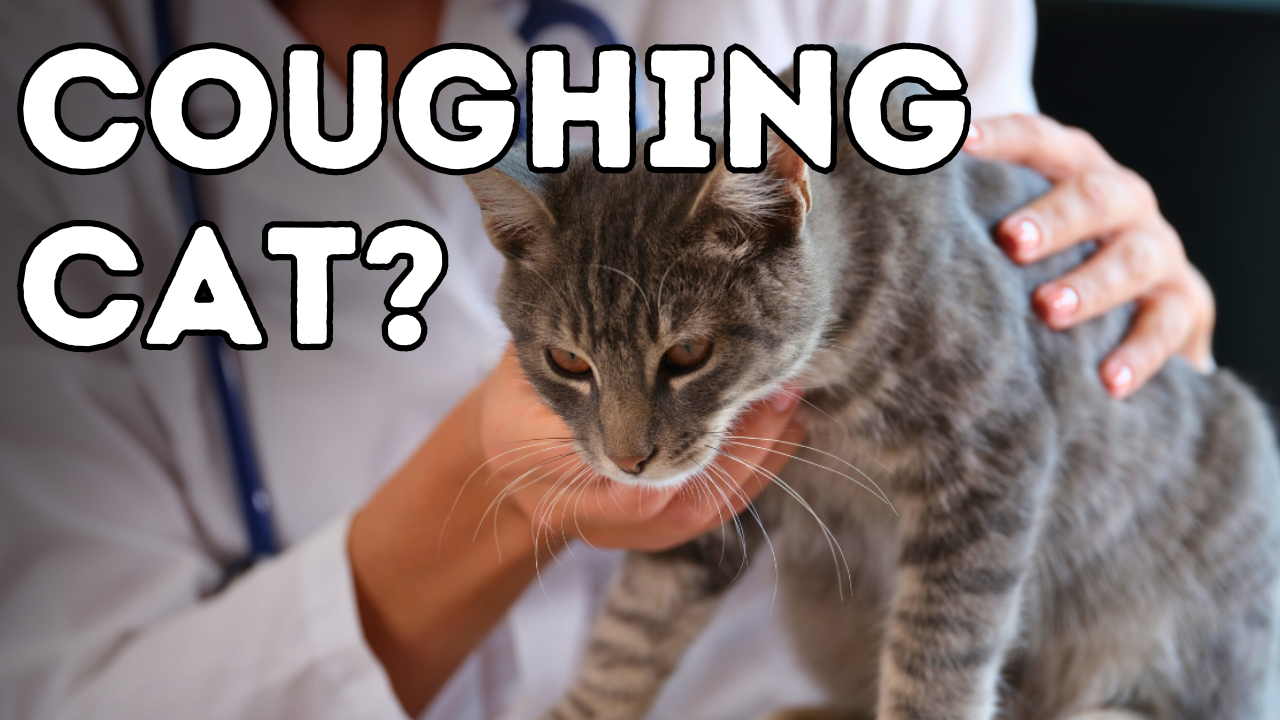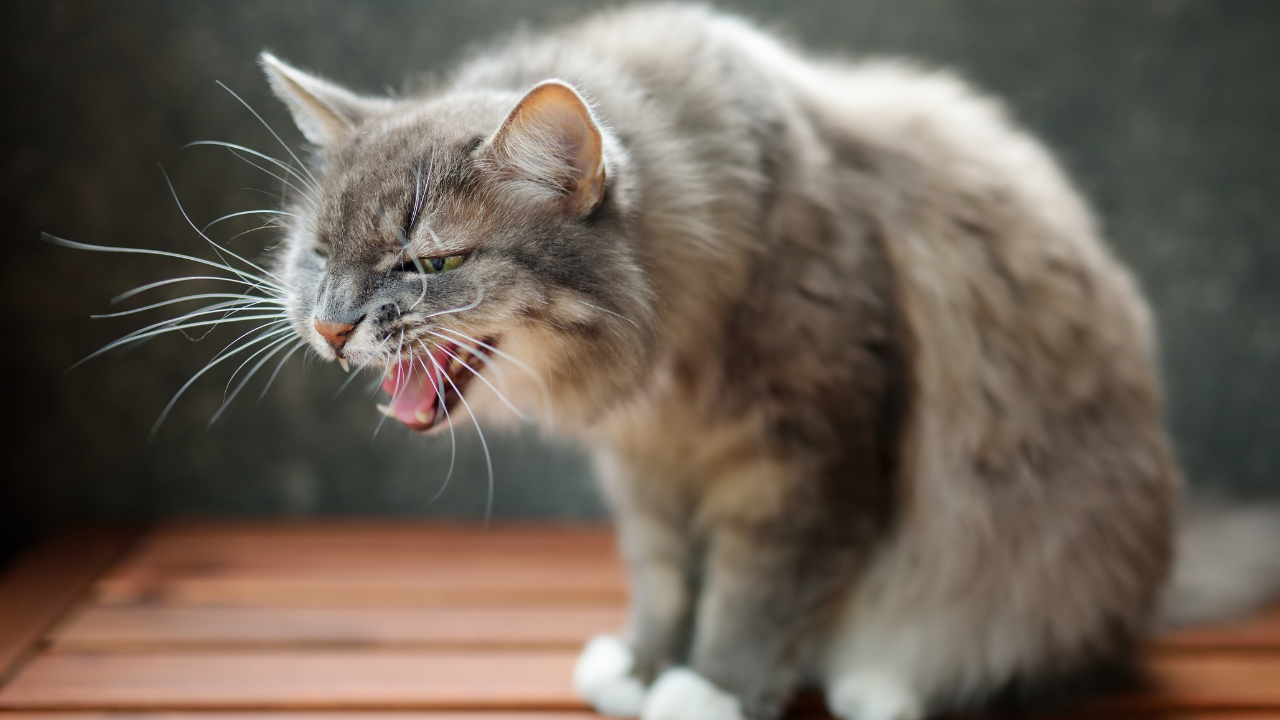Coughing cat? It may be asthma

If you have a cat with a chronic cough, then it’s a good chance your cat has asthma.
It’s way more common than most people think.
One of the ways to potentially help your cat is by providing additional antioxidants to help decrease free radical damage, and lung inflammation.
My supplement has additional antioxidants, along with nutrients such as probiotics designed to decrease inflammation.
Seems like a good idea to be on this…
Cat Cough Relief supplement- buy now
Dr. Jones’ Ultimate High Absorption 95% Curcumin for Dogs and Cats


Asthma in Cats: Signs, Causes, and Solutions
Recognizing the Signs of Asthma in Cats
Asthma is a condition that affects cats, not dogs. One of the most common signs is coughing without producing hairballs. This is often accompanied by difficulty breathing, and you might even hear a whistling sound when your cat breathes.
Understanding the Causes
Asthma occurs when the airways in your cat’s lungs narrow, making it difficult to breathe. This narrowing can be triggered by various factors, such as smoke, pollen, new foods, or even stress.
Effective Solutions for Managing Asthma in Cats
It’s in the Air: Avoiding Triggers
One of the best ways to manage your cat’s asthma is to avoid chemical irritants that could trigger an attack. If you smoke, do so outside. Steer clear of perfumes, deodorizers, and strong chemical cleaners. Consider investing in an indoor air filter to remove small particles that might irritate your cat’s lungs.
Elimination Diet: Identifying Food Allergens
Food allergens can be a culprit in triggering asthma in some cats. You can create a hypoallergenic diet by using a unique protein like turkey, combined with a healthy fat such as sunflower oil, and a supplement like Ultimate Feline. Alternatively, you can try a veterinary allergy diet, such as duck and potato. Whichever diet you choose, it needs to be fed for 12 weeks to see results.
Emotional Control: Calming Your Pet
Asthma can sometimes be triggered by stress. A common flower essence, Bach Rescue Remedy, can be beneficial in calming your cat. Administer 3-4 drops in your cat’s mouth every hour until they relax.
Weight Management: No Roly-Poly Cats Wanted
If your cat is overweight, it’s important to start a weight-loss program with a calorie-reducing diet. Reducing body fat can make it easier for your cat to breathe.
Steaming is Best: Increasing Humidity
Increasing the humidity in your home can reduce the frequency of asthma attacks. Regularly use a humidifier or vaporizer to maintain 30% humidity. During an asthma attack, turn on the shower and steam your bathroom to help your cat breathe easier.
When to See Your Veterinarian
In the case of a severe asthma attack, your cat will need emergency treatment. Your veterinarian may administer oxygen and specific anti-inflammatory medications.
Supplemental Protection for Your Cat
Vitamin E: Antioxidant Support
Vitamin E is a powerful antioxidant that can prevent or reduce the severity of asthma attacks. For an average 10 lb cat, I recommend giving 100 IU per day. You can poke the capsule and drizzle it on your cat’s food.
Something Fishy: Krill or Fish Oil
Every asthmatic cat should have krill or fish oil in their diet. Krill oil is particularly beneficial as it has high levels of EPA/DHA without the toxins found in most fish oils. The recommended dose is 1/2 to 1 capsule daily. Omega-3 fatty acids have been shown to decrease the severity of asthma in certain children, and our Krill oil supplement is a great option.
Homeopathic and Herbal Remedies
Arsenicum: Homeopathic Relief
Arsenicum is often helpful in managing asthma, especially when coughing is a primary symptom. During a severe relapse, give Arsenicum 6C every 2-3 hours, then switch to a 30C dose once a week.
Slippery Elm: Herbal Remedy
Slippery elm, derived from the bark of the slippery elm tree, is a very safe and often effective remedy for cats. I use this remedy frequently. Give 1 capsule (per 10-20 pounds) mixed with warm water daily. This gruel can be given before meals by syringe or eyedropper, or added to baby food, canned food, or a homemade diet.
Creating a Slippery Elm Syrup
For a more potent option, you can create a slippery elm syrup. Place 1/2 cup of cold water and 3/4 teaspoon of powdered slippery elm bark in a small saucepan. Whip with a fork to break up clumps, then simmer on low heat for 1-2 minutes until it thickens to a syrup consistency. Cool and refrigerate for up to 7 days.
95% Curcumin: Natural Inflammation Relief
Curcumin, the active ingredient in turmeric, has been shown to improve airway obstruction in people with asthma. For cats, I recommend 125mg of Dr. Jones’ HIGH ABSORPTION 95% Curcumin daily (1/2 a capsule), given with food.
Cat Cough Relief supplement- buy now
Dr. Jones’ Ultimate High Absorption 95% Curcumin for Dogs and Cats

P.S. If you have a coughing cat, think asthma as a possibility. Don’t wait until your cat needs to be on steroids.
P.P.S. About my cat supplement:
- Additional antioxidants
- Probiotics
- Decreased inflammation, and potentially less chance of asthma
It’s available here: Dr. Jones’ Ultimate High Absorption 95% Curcumin for Dogs and Cats

Thanks for all the great info you provide. Chewy gets your ultimate Feline formula ?I’ve read your book and it mentions lobelia – yet you don’t mention it here. I bought a bottle but not sure of exact dose?
Should I continue it or switch to a different product mentioned in this article?
You’re the best!
Yes the best!
Hello thanks for all the information. I have curcumin and serrapeptase which she will only eat with food so not sure the serapeptase works with food. I will buy your supplements to help support my babys health. (Cat)???